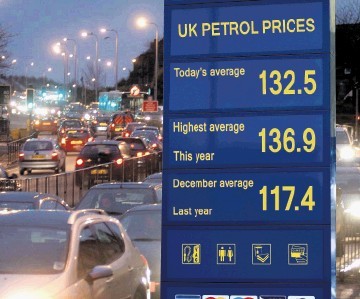
More than 30 MPs are backing a campaign for the competition watchdog to fully investigate vehicle fuel pricing amid growing anger around the “rip-off” cost of diesel.
FairFuelUK said 32 MPs from across all parties had pledged their support this week to its campaign for the Competition and Markets Authority (CMA) to look at retail price changes in relation to oil cost fluctuations, commodity speculation, wholesale prices and distribution costs “to stop further blatant, opportunistic and unfair profiteering taking place at the pumps”.
The support comes as the RAC called on supermarket fuel retailers to make further cuts to the price of diesel, saying a reduction in wholesale costs leaves scope for at least another 3p cut.
Tesco and Sainsbury’s, which together have 800 filling stations in the UK, cut the pump price of diesel by 2p per litre yesterday.
But RAC Fuel Watch data shows the wholesale price of diesel has now fallen 6p a litre lower than petrol, meaning there is scope for at least another 3p a litre cut, the organisation claims.
RAC fuel spokesman Simon Williams said a fundamental change in the fuel market was taking place as a result of Saudi Arabia opening two new refineries last year geared to the production of refined oil products, including diesel.
Mr Williams said: “Saudi Arabia had previously concentrated on exporting crude, leaving refining to other countries, but greater European demand for diesel has led the kingdom to increase its refining capacity to create a profitable additional source of income.
“We expect this increase in diesel production to have a long-term positive effect on pump prices.
“If retailers operate transparently we will see reductions in the wholesale price of diesel passed on at the forecourt.
“This should mean diesel will soon be sold for the same price as petrol, or less, just as it is in other countries around Europe.”
The RAC’s Fuel Watch report for June showed the wholesale price of diesel was 1p to 3p a litre lower than petrol throughout the month, yet the average price of a litre of diesel at the pump is 120p, compared with 117p for petrol.
Mr Williams said: “We would like retailers, particularly the supermarkets who tend to lead the way in forecourt pricing, to explain why they are maintaining an artificial gap between petrol and diesel.
“It would be very worrying if they were simply taking advantage of motorists’ expectations that diesel is always more expensive than petrol.”
FairFuelUK campaign founder Howard Cox said: “The RAC’s latest figures clearly show that diesel drivers have been ripped off by more than £0.25billion in the last six weeks at the pumps.
“This is brazen and unscrupulous profiteering by retailers exploiting 12 million motorists, white van drivers and the haulage industry.
“FairFuelUK calls on Brian Madderson, head of the Petrol Retailers Association, to come clean as to why such opaque and maverick pricing practices amongst his members continues unchecked for all vehicle fuels.”
The AA has also accused road fuel retailers of “plundering ordinary diesel car drivers to the tune of 4p to 6p a litre” since April, saying the failure of pumps across the UK to reflect that the wholesale cost of diesel was the same as petrol – and increasingly cheaper through June – had become known as the “2015 great British diesel rip-off”.
AA president Edmund King said: “In April, the trade told the AA that the reason was because their margin on diesel being sold to business drivers was so low that they had to compensate by pumping up the price charged to ordinary diesel drivers.
“In effect, private diesel car owners, who had already paid at least £1000 more to buy their diesel cars as opposed to the petrol versions, have been subsidising the cost of diesel to businesses.
“This week, some of the supermarkets have knocked 2p off the cost of a litre of diesel. But until the average price of diesel is at least 1p lower than petrol at the pump, the move is not much more than throwing scraps to diesel drivers.
“The industry has got away with this because there is no fuel price transparency to show what they pay for their fuel and what they charge to their customers.
“What has happened this summer is a direct result, and had to be a number one priority of government to ensure fair pricing at the pump.”